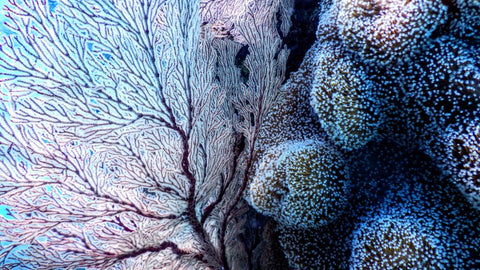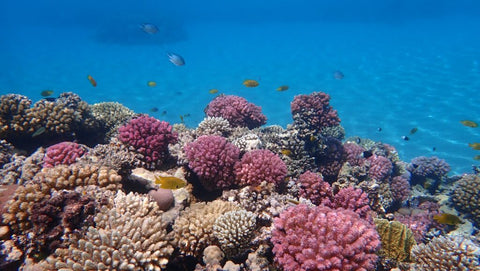💕 SITE-WIDE 20% OFF WITH CODE "SUMMERSOMEWHERE" + FREE SHIPPING ON ALL ORDERS ABOVE $100 💕
*A sweet extra: code stacks with existing discounts! All sales final.
Coral Conservation #protectwhatyoulove
 Coral reefs may only occupy 0.1% of the entire ocean but they remain crucial to the marine ecosystem as they support more than 25% of all marine species on the planet. Regarded as “the rainforests of the sea,” coral reefs provide three-dimensional habitat for other plants and organisms and also act as a buffer to protect our shorelines from storms and floods.
Coral reefs may only occupy 0.1% of the entire ocean but they remain crucial to the marine ecosystem as they support more than 25% of all marine species on the planet. Regarded as “the rainforests of the sea,” coral reefs provide three-dimensional habitat for other plants and organisms and also act as a buffer to protect our shorelines from storms and floods.

Yet given the sensitivity of the coral, destructive fishing practices, unsustainable coastal development, and pollution have all contributed to their degradation. Today, about half the world’s shallow-water coral reefs have already disappeared.
The Birch Aquarium, part of Scripps Institution of Oceanography at UC San Diego, shares their insight in coral conservation.
“Coral fragments are smaller pieces of coral that break off due to waves and storms that grow into new coral colonies.” Fragmentation is a natural process and is a crucial part of the coral’s reproduction cycle. By planting corals under the observation of institutions such as Scripps, younger corals can avoid the threats of bleaching and destruction and have a significantly higher chance of healthfully reproducing due to more room, more exposure to light, and better water flow.

“Coral comes with beautiful colors, single-celled algae that live in tissue of coral and photosynthesis provides food for the coral.” However, when there is an increase in the ocean’s temperature, corals will expel the algae from their tissue which causes the coral to turn completely white and lose their vibrant colors. Coral bleaching, as well as ocean acidification, can result in a reduced growth rate, decrease the rate of reproduction as well as increase vulnerability to diseases and skeleton degradation.
“Don’t wait for a special occasion to protect reefs.” Start today—and every day! One of the best ways to fight the effects of global warming and lessen large-scale threats to reef ecosystems is to conserve energy, follow the 3 R’s (reduce, reuse, recycle), and decrease your water usage as much as possible. Be a smart consumer by choosing seafood that is sustainable and avoid buying coral jewelry. By doing this, you are advocating for our beautiful oceanic community and restoring our loved coral reefs.
Join us in keeping the coral reefs healthier by not wearing sunscreen with oxybenzone, avobenzone, octisalate, octocrylene, homosalate, and octinoxate. Look for mineral sunscreens with “non-nanosized” zinc oxide or titanium dioxide – or better yet, wear our Coral Deco UPF50+ rash guard!
 Blocking 98% of UVA and UVA rays, our Loop UPF50+ rash guard not only saves your skin but also reduces the amount of sunscreen in our oceans. Beyond the beach, pack for the perfect mountain hike, yoga class, or ski trip. More than just sun protection, this is your new go-to base layer. Long sleeves with thumb-hole, YKK zipper opening at back neck, and signature Loop toggle. Made from REPREVE recycled PET plastic bottles, we’re in lockstep with you to #ProtectWhatYouLove.
Blocking 98% of UVA and UVA rays, our Loop UPF50+ rash guard not only saves your skin but also reduces the amount of sunscreen in our oceans. Beyond the beach, pack for the perfect mountain hike, yoga class, or ski trip. More than just sun protection, this is your new go-to base layer. Long sleeves with thumb-hole, YKK zipper opening at back neck, and signature Loop toggle. Made from REPREVE recycled PET plastic bottles, we’re in lockstep with you to #ProtectWhatYouLove.
At Loop, we’re circular. There’s no such thing as waste.
Learn more about coral conservation and how you can support the coral reefs at:
https://scripps.ucsd.edu/research/topics/coral-reef-biology-and-ecology
https://scripps.ucsd.edu/labs/coralreefecology/research/100-island-challenge/




